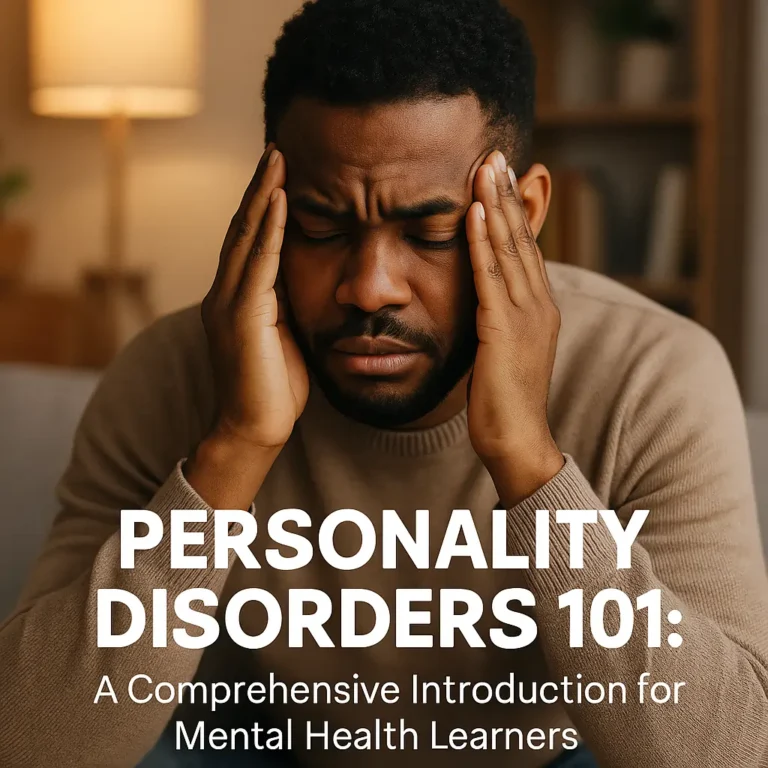Personality Disorders 101: A Comprehensive Introduction for Mental Health Learners
Understanding personality disorders is essential for anyone navigating the world of mental health—whether you’re a provider, caregiver, student, or someone living with one. These disorders affect how individuals think, relate to others, and manage their emotions. The impact is deep and often misunderstood.
At GloFusion, we believe in breaking down complex mental health topics into clear, accessible knowledge that empowers growth, healing, and compassionate care.

Page Contents
What Are Personality Disorders?
Personality disorders are long-standing patterns of thoughts, behaviors, and feelings that deviate from cultural expectations and interfere with relationships, work, and overall functioning. These patterns are often rigid, persistent, and cause significant distress for the individual or others.
Core characteristics include:
🧠 Difficulty adapting thoughts or behaviors to social contexts
💬 Disruptive interpersonal relationships
😟 Distorted self-image or self-perception
📉 Impaired emotional regulation
🔁 Persistent across time and situations (American Psychiatric Association)
There are ten recognized personality disorders, categorized into three groups (Clusters A, B, and C), each with distinct traits and challenges.
How Are Personality Disorders Diagnosed?
Diagnosing personality disorders can be complex, as many traits overlap with other mental health conditions. A diagnosis is usually made by a licensed clinician using tools like structured interviews and psychological assessments, often following criteria from the DSM-5.
What professionals look for:
📋 Patterns that began in adolescence or early adulthood
📆 Long-term, inflexible behaviors that cause problems
🧠 Rule out other psychiatric or medical explanations
📉 Functional impairment across social, occupational, or other domains
💬 Insight and willingness to change may vary significantly by disorder
At GloFusion, we emphasize a comprehensive approach that considers the full individual—not just a checklist of symptoms.
Why Understanding Personality Disorders Matters
Misunderstanding or mislabeling personality disorders can cause stigma and hinder treatment. Greater awareness helps reduce judgment and improves outcomes, especially when conditions like Borderline Personality Disorder (BPD) or Narcissistic Personality Disorder (NPD) are involved.
Why knowledge makes a difference:
💡 Increases empathy for those living with mental health challenges
📘 Helps clinicians choose the right therapy (e.g., DBT for BPD)
🤝 Encourages patient engagement and shared decision-making
🛑 Reduces stigma around complex diagnoses
🔍 Supports early intervention and better long-term management (NIMH)
Mental health learners and caregivers are often the first line of support—understanding is their most powerful tool.

Treatment and Support: What’s Available?
While personality disorders are deeply rooted, they are treatable. Treatment often includes psychotherapy, with specific approaches depending on the type of disorder. Medication may be used to manage co-occurring issues like depression or anxiety.
Common treatment approaches:
🧠 Dialectical Behavior Therapy (DBT) – especially effective for BPD
💬 Cognitive Behavioral Therapy (CBT) – addresses harmful thinking patterns
💊 Medications – SSRIs or mood stabilizers for co-occurring symptoms
🤝 Group therapy – builds interpersonal skills and support
📚 Psychoeducation – helps individuals and families better understand the condition (Mayo Clinic)
At GloFusion, we collaborate with clients to develop care plans that focus on stability, emotional growth, and improved relationships.
Conclusion: Learning Is the First Step Toward Healing
Understanding personality disorders isn’t just for professionals—it’s for anyone who wants to build a more inclusive, compassionate approach to mental wellness. With education and empathy, we can reduce stigma and help more people find the path to healing.
👉 Looking to learn more or need support managing personality-related challenges? Contact GloFusion in Griffin, GA for expert mental health care.

